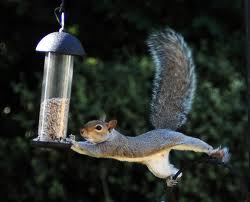 You may notice squirrels in the park or along the side of the road when you’re driving, but is it possible for one to enter your home? You might not realize right away, but a whole family of them could be living in your attic!
You may notice squirrels in the park or along the side of the road when you’re driving, but is it possible for one to enter your home? You might not realize right away, but a whole family of them could be living in your attic!
Squirrels can scurry up trees, cross a branch and climb onto your roof. From here, all they need is a one-inch hole or weak area in the soffit or fascia to chew through and start building nests in your attic. Like all rodents, squirrels can wreak havoc on your home in a number of ways.
Physical Damage
Perhaps the costliest factor of a squirrel infestation, these critters have teeth strong enough to break apart acorn shells and other nuts. To keep their teeth under control, they have to gnaw and build nests. Within your home, this natural behavior of squirrels could result in:
- Damaged Wiring: Squirrels love to chew on wiring, which has a hard surface for gnawing. The damage may be gradual – starting as bite marks along electrical cords – or could be so swift that a fire suddenly starts with no apparent source.
- Exterior Damage: Vinyl and wood siding are also fair game. Between these parts and your attic, moisture is allowed to pass through, leading to leaks, water damage and flooding that also appears to have no source.
- Insulation: Why are your heating and cooling bills going up? Until you discover squirrels in your home, they could be tearing apart your home’s insultation or ruining it with bodily fluids. In all cases, it’s less effective, damaged beyond repair and will need to be replaced.
- A Fire Hazard: Squirrels also like to build nests in your chimney or vents. Flammable materials, from paper to cloth, often compose these nests. As such, a small spark could quickly go up in flames, spreading to the rest of your home if you’re not prepared.
- Flooding: Squirrels also target your home’s pipes for the same reason they go after wires, wood and siding: They need to trim down their teeth on a firm surface. The damage to your pipes may be slow, resulting in leaks and mold, or could result in a flood with no warning.
Health Hazards
Until squirrels start spreading throughout your home, their urine and feces are concentrated in the attic. When this happens:
- It gets absorbed by your insulation, damaging the material.
- It leaves a very strong odor.
- You’ll start to see stains throughout your attic.
- You get exposed to salmonella, rabies, Leptospirosis, Tularemia, other diseases and bacteria.
Bodily fluids are only one part of the problem. Eventually, when one or two squirrels die, their carcasses remain in your attic or get trapped in your walls. In either case, they can be difficult or hazardous to remove. Their bodies also contribute to the odor problem and may start to attract other pests.
A third hazard, squirrels are often not alone. They may be carrying ticks – especially if they enter your home during spring or summer – and their carcasses may start to attract mites and fleas.
Have you found squirrels living in your home? We can remove the pests from your property or help repair the damage they’ve left behind. To schedule an appointment or learn more about our services, give us a call today!


